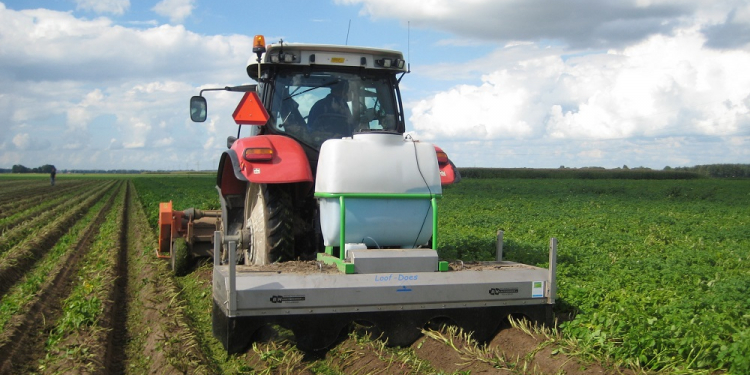According to a study published on Tuesday (30 November), the cost of pesticides may far outweigh the economic benefits.
By WESTER VAN GAAL BRUSSELS, 30. NOV, 07:08

The Bureau for the Appraisal of Social Impacts for Citizen Information (BASIC), a Paris-based NGO, found pesticide producers cost the EU €2.3bn in subsidies.
At the same time, the sector makes about €900m in profits, and the study argues this is not an efficient way of spending agricultural funds.
“Tripling organic farms by 2030 would cost €1.85bn per year – less than the annual subsidies being spent on pesticides,” a group of researchers connected to BASIC wrote.
The study also mentions other costs to society that are used to benefit pesticide producers, including the big four – BASF, Bayer, ChemChina, Corteva – which represent 60 percent of global sales.
For example, the EU doles out €57.8bn in annual subsidies to maintain pesticide-reliant agricultural practices – or about half of the total EU budget.
A portion of this money ends up in the pockets of these companies.
Machinery, fertilisers, pesticides and hybrid/GMO varieties have also had beneficial effects. Global agricultural production has increased by 350 percent in the last 20 years.
This helped the pesticide industry reach an annual turnover of €53bn in 2020 – and the EU is one of the biggest consumer markets, with €12bn in sales to farmers in 2019.
However, the study states that the adverse effects on the environment, biodiversity, and human health potentially outweigh these gains.
It references earlier studies by the French National Institute for Agricultural Research (INRA) that estimated the health cost of pesticides in the United States at around €1.3bn to €13bn annually.
And studies confirming suspicions that pesticides cause cancer, Parkinson’s or other diseases continue to mount.
In 2015, the World Health Organization’s International Agency for Research on Cancer (IARC) also concluded there is “strong evidence” exposure to glyphosate can cause DNA damage.
The pesticide industry pays its EU lobbyists a collective €10m a year, but its message that pesticides are necessary to improve productivity is starting to attract criticism.
According to a Nature study,productivity in many crop-producing areas around the globe that use pesticides is going down.
Although there is no definitive proof connecting lower yields with pesticides, there are signs resistance against pesticides is rendering them less effective.
French president Emmanuel Macron has pledged to use its EU presidency in 2022 to work towards an accelerated phase-out of pesticide.
In its landmark farm-to-fork strategy, the European Union has set a target of a 50-percent reduction in pesticide use by 2030.
However, it is also set to renew authorisation of the weedkiller glyphosate next year, EUobserver reported.
The report strongly advises against renewal as an essential first step for the EU to reach its own sustainability goals.

- As goods within the EU are supposed to move freely across national borders, treated food thus gets spread around. That’s why consumers might find vegetables and fruit treated with chlorpyrifos in their grocery stores even if such treatment has never been allowed in the country.
- A pan-European alert system has been set up for national authorities to notify other authorities on findings of hazardous food. These alerts often come after suspicious products have been sold – and consumed.
- Eight member states have banned, or never authorised the use of chlorpyrifos products: Denmark, Finland, Germany, Ireland, Latvia, Lithuania, Slovenia and Sweden.
- The United Kingdom banned the use of chlorpyrifos, with one exception, in 2016. Chlorpyrios is not authorised in Norway, nor in Iceland. The Swiss government decided to withdraw permissions for 12 chlorpyrifos and chlorpyrifos-methyl products 12 June, according to newspaper Tagblatt.






